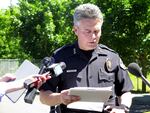Vancouver Police Department's top leader says a recent string of police shootings involving his officers is unusual for a city Vancouver's size – but he isn't proposing any changes at the department.
Body cameras and dashcams are off the table for now, Chief James McElvain told OPB after a string of deadly police shootings. Instead, McElvain says his department is looking at how to share more information with the community about the training his officers receive.

Vancouver Police Department Officer James McElvain talks with the press.
Dahlia Bazzaz / OPB
Meanwhile, his message to his staff is this: "Stay the course."
"This is a bit unusual for us," McElvain said. "But as you step into this profession, you acknowledge that one of the things that we're tasked with is maintaining civility within our community, maintaining order in our community, and, at some level, to do our job we may have to use force."
McElvain said it's generally rare that police calls result in police shootings. But his comments come days after the fourth police shooting in just two months. Three have resulted in deaths.
"I don't know of anything that is not working at the police department," McElvain told OPB. "Any pattern in an officer involved shooting generally has to do with the behavior of the citizen involved. Generally if people are cooperative, and they're following the direction of the officers, those typically don't end up in lethal force or shooting."
Detectives Dennis Devlin and Colton Price shot and killed 43-year-old Carlos M. Hunter during a traffic stop on March 7, the most recent of the shootings.
Related: In Vancouver, Family And Friends Mourn Death Of Carlos Hunter
Hunter, who was African-American, was stopped as part of a drug trafficking investigation, according to police. A statement from the Vancouver Police Department identified Hunter as a known gang member and said he was uncooperative and armed with a handgun.
Family members disagree, saying Hunter had not been affiliated with any gangs for years. Hunter's criminal record includes burglary and assault charges, according to The Columbian, but his last felony conviction was 18 years ago.
"People are going to second guess everything that we do," McElvain said. "The best thing we can do is say: we're training our people in a very appropriate way, we remain very current to what the best practices are for training our police officers, and then at the end of the day we have to trust them to go out and make good decisions."
Adam Kravitz, executive director of the non-profit Outsiders Inn, which advocates on homelessness issues, said the chief's comments are concerning because police have done little to instill trust toward the department.
"I am astounded that there is no willingness to look at their own policies and procedures," Kravitz said. “If the police chief says 'stay the course,' that is a problem.”
On Feb. 5, a police chase crossed into Portland and resulted in a shootout that shut down Interstate 84.
On Feb. 19, officers responding to a domestic disturbance call shot and killed 16-year-old Clayton Joseph after he allegedly brandished a knife.
A week later, 29-year-old Michael Eugene Pierce, who family members have said was homeless and suffering from mental illness, was killed in downtown Vancouver after waving and pointing replica guns.
Vancouver Police don't have body cameras or cameras on their vehicle dashboards. McElvain said the department isn't considering them because of the staffing and financial resources that would require.
"While we recognize that is a tool out there, we are not prepared to put those into operation anytime soon," he said.
Kravitz, a proponent of body cameras, said a petition is circulating to get the department to purchase them.
"If they are so confident that these shootings have been and will continue to be justified, then they should have no problem being recorded and filmed and accountable to the public they serve," he said.
McElvain said at least 85 percent of Vancouver Police Department has received 40 hours of critical incident training, which includes training on how to handle people in the middle of a mental health crisis. He said the goal is to train 100 percent of the department.
"Often time the public looks at officer-involved shootings and immediately says, 'Well our officers need to have more training, they need to learn how to engage people that are in crisis, de-escalation,'" he said. "And I can assure our community that we do this training all the time."